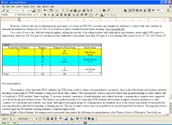 This product, created for MIT 530-Evaluation and Change in Instructional
Development, is a Training Needs Assessment that comprises an evaluation of the perceived needs for, feasibility of, and
recommendations for a proposed change to include more international learning
experiences in the university environment. The plan follows Allison Rossett's
purpose-based Training Needs Assessment model (Rossett, 1987).
This product, created for MIT 530-Evaluation and Change in Instructional
Development, is a Training Needs Assessment that comprises an evaluation of the perceived needs for, feasibility of, and
recommendations for a proposed change to include more international learning
experiences in the university environment. The plan follows Allison Rossett's
purpose-based Training Needs Assessment model (Rossett, 1987).
The idea for this Training Needs Analysis came from faculty members of the Watson School of Education at the University of North Carolina at Wilmington. There seemed to be a generalized belief that students and faculty alike desired more international learning experiences and that students needed more practice in cross-cultural learning to prepare themselves to live in and teach in a global society. Our team took on the project of analyzing this perceived need to see if the facts actually backed up the generalized feeling of the education school members, and if so, to recommend ways that would be best utilized to close the gap between the current and ideal situations. We were fortunate that the faculty of the Watson School of Education made themselves readily available for interview on this subject, as well as making their classes available for administration of the student surveys during class time. Data analysis took place in the computer labs in the education building using the supplied SPSS software.
This product was intended to inform the Watson School of Education faculty of the accuracy and pervasiveness of the perceived desire to increase worldwide learning. It was approached with the professionalism that would be expected for such a project, since we thoroughly believed our analysis would be useful to and used by the university. Findings were presented to the faculty members who participated in the interviews and surveys. Our survey recommended further analysis beyond the scope of our survey, since we did not delve into the economics or technological feasibility of the initiative. Our assessment was one of the factors leading to international student exchange agreements between UNCW and foreign universities.
This product was a collaboration of a three-person team. All team members participated in the interviews, data collection and analysis (including designing and administering surveys), and the writing of the final product. I specifically contributed by interviewing faculty members, developing student and faculty questionnaires, analyzing data, and writing portions of the report.
From this process, I learned the importance of testing perceptions with data, both quantitative and qualitative. Our research confirmed the perceived need of students and faculty for more international learning experiences, but also revealed a disparity between the supposed methods students would prefer to achieve these experiences and what had been anticipated. Had an initiative like this proceeded without a complete Training Needs Analysis, the resultant implementation could have failed not because of a lack of interest, but because of a misapplication of the tools used to achieve it.
| Domain of Instructional Design | ||
| Competency | Artifacts | Rationale |
|
Plan and conduct
needs assessment |
Training needs assessment [.doc] | The artifact demonstrates understanding the Training Needs Assessment process. |
| Assess
learner/Trainee characteristics |
Training needs assessment [.doc] | The
needs assessment in this artifact assesses all stakeholders.
|
| Analyze
characteristics of setting (learning environment) |
Training needs assessment [.doc] | Extant data, surveys and interviews were use to analyze the learning environment. |
| Conduct analysis of jobs/tasks and content. | Training needs assessment [.doc] | Data analysis is
included in this artifact. |
| Domain of Evaluation | ||
| Competency | Artifacts | Rationale |
| Plan and conduct needs assessment. | Training needs assessment [.doc] | This artifact is a complete need assessment. |
| Plan and conduct evaluation of instruction/training. | Training needs assessment [.doc] | This
artifact evaluates and makes recommendations about the Worldwide
Learning initiative. |